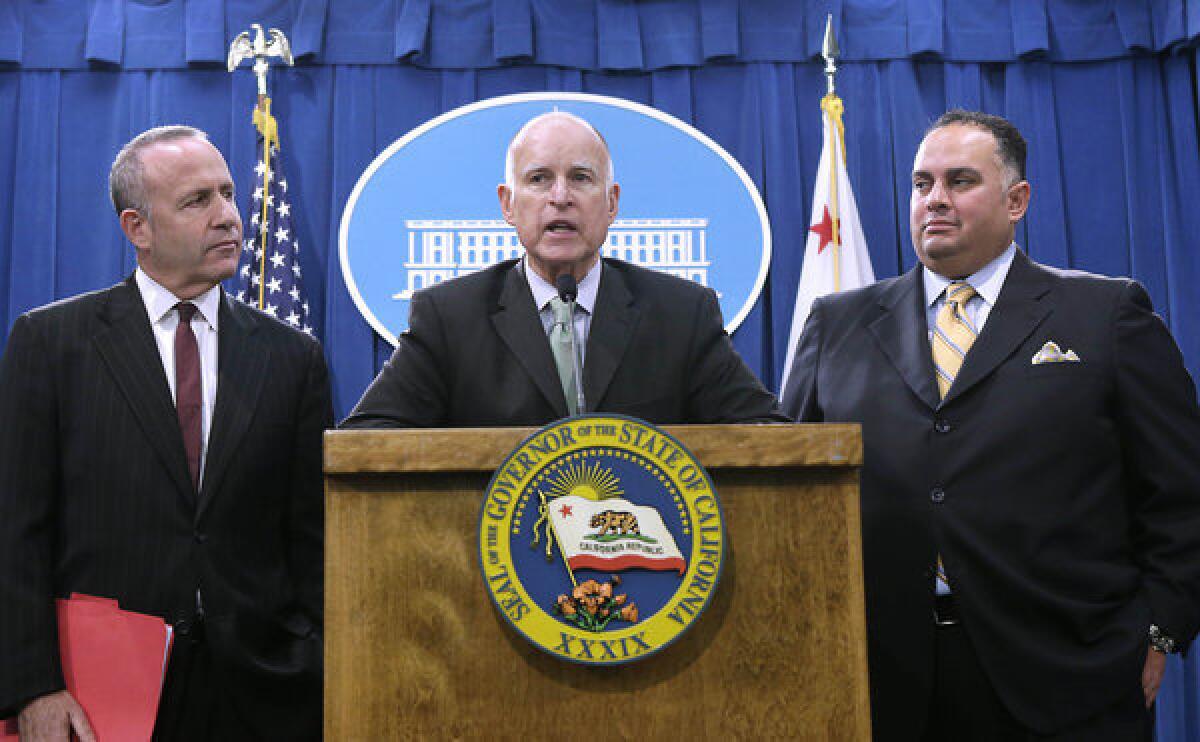Budget could limit public’s access to government documents

- Share via
SACRAMENTO — Gov. Jerry Brown is poised to sign legislation that could reduce the public’s access to basic government records that have long been used to scrutinize the actions of elected officials.
The proposal, a late insert into the state budget that lawmakers passed last week, would allow local officials to opt out of parts of the California law that gives citizens access to government documents.
Under that law, officials now must respond to a request for records from a member of the public within 10 days and are required to make the documents available electronically. The change, which Brown requested as a cost-cutting measure, would allow the officials to skip both requirements with a voice vote.
The same vote would permit them to reject requests without explanation and would no longer require them to help citizens identify existing information.
Brown and other defenders of the legislation predict that it would have little effect — that most local governments would choose to abide by the old rules. But the California Newspaper Publishers Assn. called the measure a stealth attack on government transparency and a blow to the public’s right to information.
“If the local agencies were predisposed to share information with the public,” association lobbyist Jim Ewert said,” there wouldn’t be a need for a public records act to begin with.”
Ewert, who wrote to Brown this week urging him to veto the bill, said the governor’s record on open government is spotty. He cited Brown’s 2012 decision to temporarily suspend open-meeting laws for local governments and three closed-door or private phone meetings that the governor had with Los Angeles County supervisors to sell his prison overhaul in 2011.
“I wouldn’t give him very high marks,” Ewert said. “His actions don’t demonstrate a strong commitment to government transparency.”
News organizations rely on California’s open-records law to help expose information about state and local government that may otherwise remained hidden.
The Times has used the law to find the results of child abuse investigations and the amount of pension money paid to public retirees. Times reporters have also used the law to aid in uncovering questionable spending in public institutions such as the Los Angeles Memorial Coliseum and in revealing corruption in the city of Bell, where officials paid themselves outsized salaries and imposed illegal taxes on residents.
Bell resident Donna Gannon, 59, worries that changing the law could disable what little civic engagement exists in cities across the state. “Too much is going to be hidden from us,” she said. Government officials, she noted, “work for us.”
Brown’s Department of Finance spokesman, H.D. Palmer, said the proposal maintains the public’s right to know what officials are doing. “This does not alter the core provisions of the Public Records Act,” he said.
The nonpartisan Legislative Analyst’s Office estimates that the measure would save tens of millions of dollars a year because Sacramento would no longer have to reimburse local governments for the cost of providing some records. Cities and counties would assume those costs.
Sen. Mark Leno (D-San Francisco), chairman of the Senate Budget Committee, voted to change the law. He said that if any local agency decided not to comply with its provisions, voters could direct their anger at those officials.
“Their own constituents will be aware that it is they who have decided it is not worth their expenditure of their funds,” Leno said.
The California Public Records Act, which established access to government information as a “fundamental and necessary right of every person in this state,” was signed into law by Gov. Ronald Reagan in 1968. In 2000 and 2001, Gov. Gray Davis expanded it.
Los Angeles County in 2002 filed a legal challenge to those new requirements with the Commission on State Mandates, successfully arguing that the new provisions put a financial burden on local governments that should be reimbursed by the state.
Brown’s proposal, by making compliance with those provisions optional, would gut key pieces of the law, opponents said. But the measure sailed though both houses of the Legislature during Friday’s budget debate with just one Democrat, Leland Yee of San Francisco, voting against it.
Yee, who is running for secretary of state next year, said the measure was “just the latest indication this nation is moving backward in terms of being open and transparent.” He said many of his fellow Democrats share the blame for that trend.
“This came from the governor, but it was blessed by the leadership,” he said. “I thought that there would be sufficient checks and balances that something like this would not occur.”
The measure was tucked into a larger bill on government administration, one of 21 pieces of budget legislation. The 107-page measure directs billions in state spending, creates a new grant program for trauma centers, makes changes to the workers’ compensation system and limits tax credits for owners of the Honda Center in Anaheim, among other things.
Brown would have to reject the entire bill if he were to block the open-records proposal, and his administration has indicated that he intends to sign it.
Times staff writer Ruben Vives contributed to this report.
More to Read
Sign up for Essential California
The most important California stories and recommendations in your inbox every morning.
You may occasionally receive promotional content from the Los Angeles Times.










